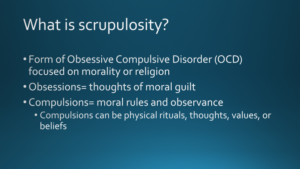What is scrupulosity? It is a question that many people ask, but not many know the answer to. Scrupulosity is a type of obsessive-compulsive disorder in which a person becomes obsessed with their flaws and imperfections. This can lead to a lot of anxiety and stress for the person who is suffering from it. In this blog post, we will discuss what scrupulosity is, its symptoms, and how to overcome it.
Contents
- 1 What Is Scrupulosity?
- 2 Signs of Scrupulosity
- 2.1 The constant fear of hell or damnation
- 2.2 Intrusive thoughts about sin or blasphemy
- 2.3 Excessive guilt and shame
- 2.4 Compulsive rituals or behaviors
- 2.5 Excessive praying or confessing
- 2.6 Excessive hand-washing or cleaning
- 2.7 Checking and re-checking
- 2.8 Checking and rechecking for sinfulness
- 2.9 Counting or touching objects a certain number of times
- 2.10 Arranging things in a certain way
- 2.11 Avoiding people, places, or things that remind them of religion
- 2.12 Trying to control thoughts
- 2.13 Obsessing over religious rules
- 2.14 Trying to be perfect
- 3 Causes of Scrupulosity
- 4 Negative Impacts of Scrupulosity
- 5 Diagnosis of Scrupulosity
- 6 Treatment of Scrupulosity
- 7 How To Avoid Scrupulosity?
- 8 How To Help Someone With Scrupulosity?
- 9 Conclusion
What Is Scrupulosity?
 A scrupulosity is a form of OCD that is characterized by an excessive focus on religious or moral issues. People with scrupulosity often feel compulsively obligated to follow certain rules or principles, even if doing so is impractical or harmful. They may also have difficulty making decisions for fear of making the wrong choice. Scrupulosity can be very debilitating, preventing people from living normal, productive lives.
A scrupulosity is a form of OCD that is characterized by an excessive focus on religious or moral issues. People with scrupulosity often feel compulsively obligated to follow certain rules or principles, even if doing so is impractical or harmful. They may also have difficulty making decisions for fear of making the wrong choice. Scrupulosity can be very debilitating, preventing people from living normal, productive lives.
Scrupulosity is often driven by a fear of sinning or making mistakes. People with scrupulosity may worry that they will be punished if they do not follow the rules perfectly. They may also feel guilty or ashamed if they make a mistake. As a result, people with scrupulosity often avoid situations where they might be tempted to sin or make a mistake. For example, someone with scrupulosity may avoid going to church because they are afraid of not being able to follow the service perfectly.
It can also be driven by a desire to be a good person. People with scrupulosity may feel compulsively obligated to help others, even when doing so is impractical or harmful. They may also have difficulty saying no to requests for help, even when they cannot reasonably accommodate the request. As a result, people with this often find themselves in difficult or impossible situations.
This can be very difficult to overcome. The first step is to recognize that you have a problem. If you are obsessively focused on religious or moral issues, and this focus is causing distress or interfering with your life, then you may have scrupulosity.
Signs of Scrupulosity

There are many signs of scrupulosity. Some of these signs are:
The constant fear of hell or damnation
One of the most common signs of scrupulosity is the constant fear of hell or damnation. This fear can be so intense that it leads to avoidance of religious practices or even thoughts about God. It may also give it a feeling of being damned no matter what they do. Sometimes the act of avoidance can take over their lives, to the point where they may even avoid people or places that remind them of religion.
Intrusive thoughts about sin or blasphemy
Another common sign of scrupulosity is having intrusive thoughts about sin or blasphemy. These thoughts can be so distressing that they may cause anxiety or panic. People with this often try to suppress these thoughts, but this only makes them more persistent. The more someone tries to avoid these thoughts, the more obsessed they may become with them.
Excessive guilt and shame
People with this often feel excessive guilt and shame for their actions, even if they are minor. They may berate themselves for not being good enough or for not living up to their standards. This can lead to low self-esteem and depression.
Compulsive rituals or behaviors
People with scrupulosity may also engage in compulsive rituals or behaviors in an attempt to control their thoughts and feelings. These rituals can be time-consuming and interfere with daily life. Some common rituals include:
Excessive praying or confessing
Another sign of scrupulosity is excessive praying or confessing. People with scrupulosity may pray for hours each day or confess their sins multiple times a day. They may also seek out confession more often than is necessary.
Excessive hand-washing or cleaning
People with scrupulosity may engage in excessive hand-washing or cleaning. This can be due to a fear of contamination or a belief that they are not clean enough. This can to skin irritation, as well as missed opportunities to socialize or participate in activities.
Checking and re-checking
People with scrupulosity often check and re-check their actions to make sure they have not made a mistake. This can include checking the locks on doors, re-reading texts or emails, or double-checking homework. This can lead to wasted time and lost opportunities.
Checking and rechecking for sinfulness
Sometimes there may be many doubts about salvation. One may check and recheck if behavior is sinful or not. This can include consulting religious authorities, looking up sins in the Bible, or reading religious texts. This can lead to excessive research and wasted time.
Counting or touching objects a certain number of times
Coupled with the need for symmetry and order, people with scrupulosity may count or touch a certain number of times. This can be due to a belief that the number has magical properties or fear of odd numbers. This can lead to wasted time and repetitive motion injuries.
Arranging things in a certain way
Sometimes there are doubts about whether something has been done correctly. This can lead to arranging things in a certain way or reducing anxiety. Also, this can include lining up books, color-coding clothing, or straightening objects. This can lead to wasted time and lost opportunities.
Avoiding people, places, or things that remind them of religion
There are often avoidance behaviors in scrupulosity. This can include avoiding people, places, or things that remind them of religion. This can lead to social isolation and missed opportunities.
Trying to control thoughts
Another common sign of scrupulosity is trying to control thoughts. People with scrupulosity may try to suppress intrusive thoughts about sin or blasphemy. However, this only makes the thoughts more persistent. The more someone tries to avoid these thoughts, the more obsessed they may become with them.
Obsessing over religious rules
People with scrupulosity often obsess over religious rules. They may need symmetry and orderliness. This can lead them to spend excessive time praying or confessing their sins. They may also engage in compulsive behaviors, such as counting or touching objects a certain number of times.
Trying to be perfect
People with scrupulosity often strive for perfectionism. They may have high standards for themselves and others. This can lead to frustration and disappointment when these standards are not met.
Causes of Scrupulosity

Like signs, there are many causes of scrupulosity. Some of these causes are:
Genetics
Genetics is one of the causes of scrupulosity. This means that if someone in your family has scrupulosity, you may be more likely to have it as well. Sometimes there may be a history of anxiety or OCD in your family. Genetics also plays a role in how your brain processes information. Also, genetics can be a cause of scrupulosity because it can be passed down from generation to generation. Sometimes there can be many doubts about salvation. One may check and recheck if behavior is sinful or not. This can include consulting religious authorities, looking up sins in the Bible, or reading religious texts.
Brain Chemistry
Brain chemistry is responsible for a person’s thoughts, emotions, and behaviors. It influences how we think, feel, and act. A person’s scrupulosity can be influenced by their brain chemistry. If a person has a chemical imbalance in their brain, it can lead to scrupulosity.
There are many ways to treat scrupulosity. Medication can be used to correct the chemical imbalance in the brain. Therapy can also be used to help a person understand their thoughts and emotions better.
Environment
The environment is another factor that can contribute to scrupulosity. If you grew up in a household where religion was very important and strict, you may be more likely to develop scrupulosity. Additionally, if you experienced trauma or abuse in childhood, you may be more prone to developing OCD and anxiety disorders, which can lead to scrupulosity.
Trauma
Trauma can also be a cause of scrupulosity. This means that if you have experienced a traumatic event, such as the death of a loved one, you may be more likely to develop scrupulosity. Sometimes, people who have experienced trauma turn to religion as a way to cope with the pain. This can lead to scrupulosity if the person becomes fixated on religious rituals and rules.
Abuse
Another factor that can contribute to scrupulosity is abuse. If you were abused as a child, you may be more likely to develop OCD and anxiety disorders. It can also be difficult to trust people if you’ve been abused, which can lead to scrupulosity.
Childhood Experiences
Childhood experiences can also be a cause of scrupulosity. This means that if you had a bad experience with religion in your childhood, you may be more likely to have scrupulosity. For example, if you were punished for not following religious rules, you may associate religion with fear or anxiety. This can lead to scrupulosity. Sometimes, people with scrupulosity grew up in households where there was a lot of fighting about religion.
Mental Health Disorders
Another cause of scrupulosity is mental health disorders. Depression, anxiety, and obsessive-compulsive disorder (OCD) are all associated with scrupulosity. People who suffer from these disorders may be more likely to develop scrupulosity because they are more prone to worry and obsess over things. Treatment for mental health disorders can help reduce the symptoms of scrupulosity.
There can be many causes of scrupulosity. If you think you may be suffering from scrupulosity, it is important to talk to a mental health professional. They can help you identify the cause of your scrupulosity and develop a treatment plan to help you overcome it.
Negative Impacts of Scrupulosity

There are many negative impacts of scrupulosity. People who suffer from this condition often have a hard time functioning in everyday life. Some of these negative impacts are:
Social Isolation
Social isolation is one of the most common negative impacts of scrupulosity. This is because people who suffer from this condition often feel like they are not good enough or that they are doing something wrong. This can lead to them avoiding social situations and withdrawing from friends and family. There can also be a lot of shame and guilt associated with scrupulosity, which can further contribute to social isolation.
Difficulty concentrating
Another negative impact of scrupulosity is difficulty concentrating. This is because people suffering from this condition often have difficulty focusing on anything other than their worries and obsessions. This can make it difficult to concentrate at work or school and can lead to problems in relationships.
Sleep Disturbances
Sleep disturbances are another common negative impact of scrupulosity. This is because people suffering from this condition often have difficulty relaxing and falling asleep at night. They may also have nightmares or sleep paralysis related to their fears and worries. This can lead to fatigue during the day and can make it difficult to function.
Anxiety and Depression
Another common negative impact of scrupulosity is anxiety and depression. This is because people who suffer from this condition often feel guilty and ashamed of themselves. They may also worry about making mistakes or about what other people think of them. This can lead to a lot of stress and anxiety. It may also lead to depression.
Self-Harm
An additional negative impact of scrupulosity is self-harm. This is because people who suffer from this condition often have a lot of guilt and shame. They may also feel like they are not good enough or that they are doing something wrong. This can lead to them harming themselves in an attempt to make themselves feel better.
Relationship Issues
An additional negative impact of scrupulosity is relationship issues. This is because people suffering from this condition often have difficulty trusting others. They may also feel like they are not good enough or that they are doing something wrong. This can lead to problems in relationships. Sometimes, people with scrupulosity may even avoid relationships altogether.
Diagnosis of Scrupulosity
Diagnosis of scrupulosity can be difficult. Many people with scrupulosity worry that they are sinners or that they are going crazy. They may avoid talking about their symptoms for fear of being ridiculed or rejected. As a result, scrupulosity often goes undiagnosed and untreated.
If you think you might have scrupulosity, it is important to seek help from a mental health professional who is familiar with the disorder. A professional can help you understand your symptoms and develop a plan to overcome them.
However, there are many other tests that one can do to check if they have scrupulosity. The following is a list of some common symptoms:
Do you have an excessive fear of sinning or breaking religious rules?
Do you spend an excessive amount of time praying, confessing, or performing other religious rituals?
Also, Do you avoid people or places that you think maybe sinful?
Do you have difficulty making decisions for fear of doing something wrong?
Do you feel guilty when you do not live up to your standards of perfection?
If you answered yes to any of these questions, you may suffer from scrupulosity. If you are concerned about your symptoms, please talk to a mental health professional.
These self-tests are also useful in checking if one has scrupulosity:
-The Y-BOCS Scrupulosity Symptom Checklist
-The Padua Inventory – Scrupulosity Scale (PI-SS)
-The Brown Assessment of Beliefs Scale – Scales for Obsessive Compulsions Related to Religion and Morality (BABS-RCM)
If you answer yes to any of these, then it is likely that you do have scrupulosity. However, you should visit a professional for an official diagnosis.
Treatment of Scrupulosity
If you suffer from any of these negative impacts, it is important to seek help. Scrupulosity can be a very difficult condition to live with, but there are treatment options available. If you think you may be suffering from scrupulosity, please talk to a mental health professional. They can help you identify the cause of your scrupulosity and develop a treatment plan to help you overcome it.
There are many different types of treatments available for scrupulosity. Some of these treatments include:
Medications
 Medications are often used to treat scrupulosity. Also, Medications can help reduce anxiety and depression. They can also help to improve sleep and concentration. There are many types of medications that can be used to treat scrupulosity. Your mental health professional can help you find the right medication for you.
Medications are often used to treat scrupulosity. Also, Medications can help reduce anxiety and depression. They can also help to improve sleep and concentration. There are many types of medications that can be used to treat scrupulosity. Your mental health professional can help you find the right medication for you.
Some of these medications are:
Antidepressants: One of the most common types of medications used to treat scrupulosity is antidepressants. Antidepressants can help to reduce anxiety and depression.
Anxiolytics: Anxiolytics are another type of medication used to treat scrupulosity. Anxiolytics can help to reduce anxiety and improve sleep.
Antipsychotics: Antipsychotics are another type of medication used to treat scrupulosity. Antipsychotics can help to reduce delusions and hallucinations.
Therapy

Another treatment option for scrupulosity is therapy. Therapy can help you to understand your thoughts and feelings. It can also help you to develop coping skills. There are many different types of therapies that can be used to treat scrupulosity. Some of these therapies include:
Cognitive Behavioral Therapy
One of the most common types of therapies used to treat scrupulosity is cognitive behavioral therapy. This type of therapy helps you to identify negative thinking patterns and replace them with more positive ones. CBT works by helping you to change the way you think about your fears and worries. This can help you to reduce your anxiety and improve your overall well-being. CBT works by helping you to:
-Identify your negative thinking patterns
-Challenge your negative thoughts
-Replace your negative thoughts with more positive ones
Exposure Therapy
Another type of therapy that can be used to treat scrupulosity is exposure therapy. This type of therapy works by helping you to face your fears. Exposure therapy can help you to:
-Reduce your anxiety about certain situations or objects
-Learn how to cope with anxiety in a healthy way
-Build confidence
Family Therapy
Family therapy is another type of therapy that can be used to treat this. This type of therapy helps you to improve communication and relationships within your family. Family therapy can help you to:
-Learn how to communicate better with your family
-Understand how your family members feel about your scrupulosity
-Build stronger relationships with your family members
Group Therapy
Group therapy is another type of therapy that can be used to treat scrupulosity. This type of therapy helps you to meet other people who are dealing with similar issues. Group therapy can help you to:
-Share your experiences with others
-Learn from others who are dealing with this
-Develop coping skills
Family-Assisted Therapy
Families play a very important role in the treatment of scrupulosity. Family-assisted therapy is a type of therapy that helps you to involve your family in your treatment. This type of therapy can help you to:
-Improve communication with your family
-Learn how to support each other
-Build stronger relationships
Support Groups
Support Groups are those that are willing to offer help and advice to those who are struggling with scrupulosity. They are a great way to get help from people who have gone through the same thing. Scrupulosity can be very difficult to overcome on your own, so support groups can provide much-needed assistance. There are many online support groups available that can offer help and advice. You can also find support groups in your local community. If you feel like you need more one-on-one assistance, some counselors and therapists specialize in helping people overcome scrupulosity.
Self-Care

Another way to overcome scrupulosity is to practice self-care. This means making sure to take care of yourself both physically and mentally. Some of these self-care activities are:
Eating Balanced Diet
One of the most important things you can do for your overall health is to eat a balanced diet. This means eating a variety of healthy foods from all the food groups. Eating a balanced diet will help your body physically and also improve your mental health.
Getting Enough Sleep
Enough sleep is critical for good health, but it can be hard to get enough shut-eye when you’re struggling with scrupulosity. This is a condition characterized by excessive worry and anxiety, which can make it difficult to fall asleep or stay asleep. If you’re struggling with this, there are a few things you can do to help yourself get more rest.
Exercising Regularly
Exercising rewires your brain to focus on the present moment and let go of worry and stress. It also helps to increase levels of serotonin, dopamine, and endorphins, which are all hormones that contribute to happiness and positive moods. A regular exercise routine can help to alleviate symptoms of scrupulosity by teaching you how to better cope with stress and anxiety.
Taking Breaks When Needed
An important thing to remember when overcoming scrupulosity is to take breaks when needed. This will help prevent you from feeling overwhelmed and stressed out. Make sure to schedule some downtime for yourself so that you can relax and rejuvenate. Taking a few deep breaths or going for a walk can also help manage stress levels. If you find yourself getting too wrapped up in your work, step away from it for a little while and clear your head. Then, come back refreshed and ready to tackle whatever task is at hand.
Spending time with supportive people
An important step to overcoming this is to surround yourself with people who will support you. These people can encourage and help you stay on track. It’s important to find a balance between spending time with these people and spending time alone. Too much of either can be detrimental.
Spending time alone
It’s also important to spend some time alone. This allows you to reflect on your thoughts and feelings without outside influence. This can help you better understand what’s causing your scrupulosity and how to overcome it.
How To Avoid Scrupulosity?

Avoiding scrupulosity may seem impossible, but it is doable. There are a few things you can do to avoid scrupulosity:
Identify Your Triggers
One of the best ways to avoid scrupulosity is to identify your triggers. What are the things that trigger your worries and anxiety? Once you know what these triggers are, you can start to avoid them. There may also be many things you can’t avoid, but knowing what sets off your scrupulosity can help you be prepared for when it does happen.
Talk to Someone Who Understands
Talking to someone who understands scrupulosity can be very helpful. This person can offer support and understanding. They can also provide helpful tips on how to cope with and overcome scrupulosity. Sometimes, it can be helpful to talk to more than one person. This way, you can get multiple perspectives on how to deal with your scrupulosity.
Find a Support Group
There are many support groups available for people struggling with scrupulosity. These groups provide a safe and supportive environment. They also offer helpful resources and information. Support groups can be found online or in person. If you’re not sure where to start, you can ask your doctor or therapist for recommendations.
Try Mindfulness
Mindfulness is a practice that involves focus and awareness. It can help you learn to accept your thoughts and feelings without judgment. Mindfulness can help reduce anxiety and stress. It can also help you become more aware of your triggers and how to avoid them.
Avoidance is always better than struggling with this. But, if you do find yourself struggling, remember that there are many resources and people who can help you overcome it. With time and effort, you can overcome scrupulosity and live a happy and fulfilling life.
How To Help Someone With Scrupulosity?

Helping someone with scrupulosity can be difficult. The first step is to try and understand what the person is going through. It is a mental disorder characterized by an excessive need for orderliness, perfectionism, and control. People with this disorder often have difficulty completing tasks because they are unable to let go of details or move on from mistakes. They may also have difficulty starting tasks because they feel like everything must be done perfectly for it to be successful.
If you know someone who suffers from this, there are some things you can do to help them:
-Encourage Them To Seek Professional Help: If the person you know is struggling to manage their scrupulosity on their own, encourage them to seek professional help. A therapist can help them understand their disorder and develop coping mechanisms to deal with it.
-Be Patient With Them: It can be frustrating to deal with someone who is constantly needing reassurance or perfection, but it is important to be patient with them. Remember that they are not doing this on purpose and that they are likely just as frustrated as you are.
-Offer Support: Let the person know that you are there for them and offer your support. This can be a difficult disorder to deal with, so having someone to lean on can make a big difference. Also, there are likely many things you can do to help, even if you don’t fully understand the disorder.
Conclusion
Scrupulosity can be a difficult thing to overcome. You may feel like you’re not good enough or that you have to be perfect. But remember, everyone makes mistakes and no one is perfect. So don’t be too hard on yourself. Talk to someone if you’re struggling and try to find ways to relax and enjoy life more. It doesn’t have to control your life. You can overcome it.
Scrupulosity, also known as religious OCD, is a type of OCD that causes severe anxiety and fear. People with this obsess about their religion or moral beliefs. They may worry that they’ve done something wrong or that they’re not good enough. It can be very debilitating and make it hard to enjoy life.
Hope this article was of help to you! If you are suffering from OCD, you may seek help from Therapy Mantra. We have a team of highly trained and experienced therapists who can provide you with the tools and skills necessary for overcoming OCD. Contact us today to schedule an online therapy or download our free OCD treatment app on Android or iOS for more information.


